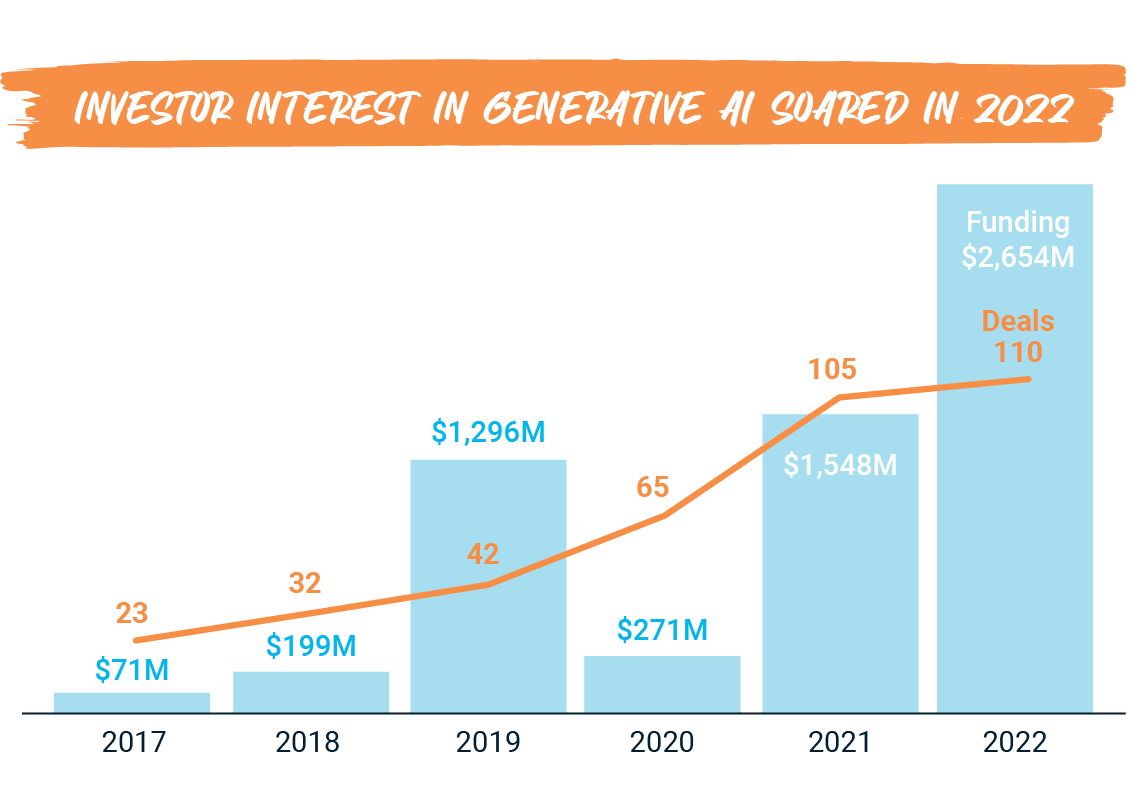- Blog
- Pros and cons of generative AI in customer experience
Pros and cons of generative AI in customer experience

Every now and then, however, a technology emerges that makes the leap from industry chatter to mainstream conversation. So it was in November 2022 when millions of people rushed to sign up for an artificial intelligence tool like few others. By February 2023 it was being hailed as the fastest-growing app of all-time2, with an estimated 100 million monthly active users within two months3 compared to TikTok (nine months) and Instagram (two and a half years)4.
The tool, of course, is ChatGPT and it continues to create headlines about its potential impact, with even doctors said to be using the chatbot to improve their bedside manner5. Not since Pokemon Go inspired hordes of gamers to get off their couches and into the streets6 has there been so much buzz about an app but the difference on this occasion is the opportunity for businesses to leverage the tool to improve customer experience.
.png?width=700&height=953&name=How%20much%20time-they%20took%20to%20reach-1%20million%20users%20%20(1).png)
Source: ChatGPT Gets 1 Million Users in Just Five Days - RankingRoyals
ChatGPT is just one part of the story though. Generative AI, the technology powering the chatbot, is the real game-changer and organisations that fail to appreciate its potential are doing themselves a disservice. With that in mind, this handy guide will shine a light on Generative AI, the subset of Large Language Models and their role in inspiring a customer service revolution.
What is generative AI?
Generative AI is a set of algorithms capable of generating seemingly new, realistic content from training data. The term can be broadly used for any AI system whose primary function is to generate content, as opposed to those that perform functions such as classifying data (eg: assigning labels to images) or choosing actions (eg: steering an autonomous vehicle).
What is a Large Language Model?
A Large Language Model (LLM) is a particular type of generative AI that uses machine learning to perform a variety of natural language processing (NLP) tasks. In essence, an LLM such as ChatGPT is fed significant amounts of textual data from the internet, samples the dataset and learns to predict what words are needed in a certain situation. Its initial efforts may be inadequate but once a model has been trained long enough on a large enough dataset, it can perform as remarkably as ChatGPT.
How can Generative AI improve customer experience?
Customer experience is a key strategic priority for modern businesses, with studies showing 81% of organisations consider it a competitive differentiator7. The good news is Generative AI can play a positive role in improving CX for various reasons.
Personalised interactions
Today’s customers have come to expect the businesses they deal with to provide tailored responses and recommendations and generative AI is taking that service to the next level. By analysing customer data and preferences, generative AI systems can generate content or provide suggestions that align with customers’ specific needs, interests and preferences and, in turn, enhance the shopping experience by making it more convenient, efficient and profitable.
Self-service
Recent studies have shown 89% of customers expect access to self-service portals when dealing with everyday problems8, which makes the rise of generative AI timely indeed. The technology can be utilised to develop the likes of interactive knowledge bases and virtual assistants and enhance the ability of customers to tap into resources that answer frequently asked questions, troubleshoot issues and learn about products and services without needing to engage with customer service staff.
Real-time assistance
Befitting a world that is increasingly about the ‘here and now’, it has never been more important for businesses to provide 24/7 customer support. Providing such service with human agents is a costly exercise but generative AI-powered chatbots or virtual assistants are easing that financial burden by handling common enquiries and assisting with basic tasks. Better still, the technology is freeing up human agents to focus on more complex issues and subsequently improve response times.
 Source: How can generative AI improve the customer experience? | ZDNET
Source: How can generative AI improve the customer experience? | ZDNET
What are concerns about generative AI and customer experience?
Amid the hype surrounding ChatGPT, there has also been plenty of focus on the technology’s limitations and the significant hurdles generative AI faces in the customer service environment.
Hallucinations
You know a technology has concerns when a new term is born to describe its habit of generating outputs that sound plausible but are factually incorrect or unrelated to the given context. In the generative AI space, this is known as ‘hallucinations’ and relates to errors emerging due to its inherent biases, lack of real-world understanding or training data limitations. While casual users may be content to navigate a few hallucinations, it is a different story in customer service where accuracy is non-negotiable.
Data privacy
As ChatGPT boomed earlier this year, one country went in another direction by banning the technology. The Italian Data Protection Authority released a statement imposing an immediate temporary limitation due to concerns that developer OpenAI was not legally authorised to gather user data. The decision highlighted the fears held by many people that such data is often indefinitely stored for model training and risks falling into the wrong hands in the instance of a security breach.
Lack of control
Generative AI has an incredible ability to generate content but how easy is it to control such information? Many businesses are finding that the very fact generative AI tools are designed to be autonomous means they operate independently and make independent decisions. When it comes to customer service, this means it is not uncommon for customers to be provided with inappropriate responses that may even go against an organisation’s purpose and values.
Summary
While many questions are being asked in the brave new world of generative AI, one thing for certain is that it is here to stay. As proven by the hype surrounding ChatGPT, people have been won over by the ground-breaking technology and there are undoubtedly benefits for business users. That said, it is essential organisations do their research to ensure the tools they deploy meet their specific needs and enhance customer experience rather than compromising it. A key step to maximise the chances of success is to partner with a CX provider that has the people, technologies and expertise to navigate what is an exciting new world.
Delivering positive customer experience is the key to modern business success but what should you do when challenges get in the way? Discover how to overcome four hurdles to building customer connection.
Reference:
[1] Pushing Buttons: Why did Google Stadia fail? | Games | The Guardian
[2] 3 Reasons Why ChatGPT Became the Fastest Growing App of All Time
[3] ChatGPT reaches 100 million users two months after launch
[4] ChatGPT sets record for fastest-growing user base - analyst note
[5] Doctors Are Using ChatGPT to Improve How They Talk to Patients
[6] Pokémon Go becomes global craze as game overtakes Twitter for US users
[7] New Research from Dimension Data Reveals Uncomfortable CX Truths
[8] Customers: opinion on self-service portal usage by brands 2018


